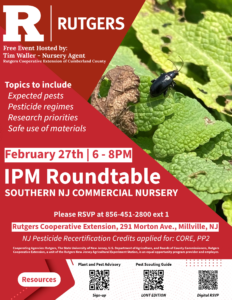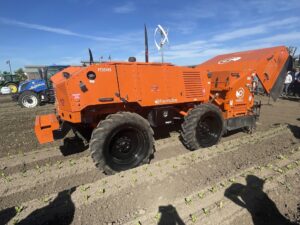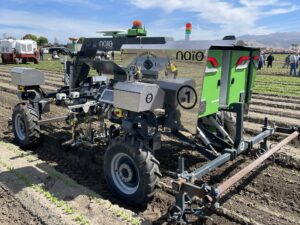Frost is common in the northeastern US. However, frost events during bloom, specifically in orchard crops, can be economically devastating. Often, the cause is a few hours below the injury threshold temperature for the developing buds, as cooler nights result in the rapid loss of thermal energy. Several passive or low-tech strategies can help maintain a slightly higher orchard floor temperature and potentially prevent substantial crop loss.
Site selection is the most effective frost protection method. When planning a new orchard, selecting a site with proper cold air drainage is the most valuable decision a grower can make and enjoy the rewards for many years. Cold air drainage is essential, so avoid buying a site or planting trees on the site that accumulate cold air. Also, identify areas where the cold air moves in and out. When possible, plant early blooming varieties in the least frost-prone areas and plant delayed and or extended bloom varieties in frost-prone areas.

Table 1. Relative temperature differences are influenced by orchard floor conditions (Courtesy, Robert Crassweller, PSU).
Do not invite the frost with excess vegetation and ground cover. The management of weeds along the row and sod between the rows will influence orchard temperatures. The bare ground will absorb more heat during the day and release more heat at night than soil covered in vegetation (Table 1). During the day, 45-50% of solar radiation gets reflected or absorbed by the atmosphere, and the earth absorbs the remaining 50-55%. Vegetation reduces this heat transfer to the soil because it reflects light before it can reach the soil surface. Removing tall weeds and windbreaks along the edges of orchards will also help improve airflow and limit the accumulation of cold air pockets in some areas of the orchard. This can be particularly important during spring bloom when just a few more degrees can make the difference between killing the flowers or not!
Extremely low grass cutting: Maintaining sod between the rows at a minimum height by frequently mowing will help with frost protection. Similarly, keeping the rows weed-free by using postemergence herbicides to kill emerged weeds and removing weed residues from the previous season will maximize the warming of the soil by solar energy during the day. Maintaining weed-free rows should also be considered by applying residual herbicides in the fall. Depending on herbicides applied in the fall, this will prevent or reduce weed emergence in early spring and give you more flexibility for applying your residual and postemergence herbicides in spring.
The cold air drain machine has a fan that pulls cold air from the surrounding ground and pushes it into the sky. This is effective in a lower section of the orchard or the end of the vineyard where the cold air drains due to a slight slope. Placing the machine in the middle of the orchard may prove ineffective as the pulled cold air could settle back into the orchard unless there is a low inversion layer to mix with warmer air. Using the cold air drain machine can enhance the effectiveness of low grass cutting. The machine costs around $15,000, and its operating cost is much less than other active frost protection methods.
Wet soil slows the release of thermal energy on frost night. However, the soil profile must be thoroughly wet. This can be achieved by irrigating the soil to field capacity (maximum water holding capacity of that soil). Also, the temperature must be warmer during the preceding days to pack sufficient heat into the soil. Sandy soils store less energy than loamy soils because there is more air space between soil particles than loamy soils. Heavier soils may require more than 8–10 hours of irrigation to reach field capacity.
Delayed pruning delays bud development, which helps avoid damage from early spring frosts. Years of observation in commercial orchards in the northeast indicate that more buds survive after a frost event, specifically in peaches, if the pruning is delayed. Often, large farm operations begin pruning early in the dormant season due to labor availability and time constraints. In such cases, avoid pruning upper branches until the risk of a late freeze has passed. Also, avoid hard blossom thinning on peaches on lower branches or blossom thinning altogether. Instead, focus only on fruit thinning, which can serve as insurance against crop loss. Remember that any available crop will likely command a good price in frost years.
Combining the above methods can have a cumulative effect on overall frost protection in the orchard. Keeping trees healthy with proper nutrient and pest management is also important. Healthy trees may still lose a crop but are more likely to survive the next season than poor vigor and diseased trees. The success of Frost Protection will also depend on understanding each method’s working principles and the combination of environmental factors necessitating its use. The bulletin https://njaes.rutgers.edu/e363/ explains what to monitor before a frost event and active frost protection methods such as irrigation, heat application, and air mixing.


 Weed management in vegetables can be difficult due to a shrinking labor pool, which is becoming more costly to source, and a lack of effective herbicides. Research and extension efforts must focus on integrating novel weed technology into current crop production systems. Autonomous and semi-autonomous robotic weed control technology has been implemented by some vegetable growers, mainly in the Western US, but is not universally available to or adapted by many producers. This survey is designed to new tools of interest (e.g. precision sprayers or cultivators, electrical weeders, drones, etc.) for managing weeds in cole crop and leafy green systems as well as the environmental, physical and economic barriers to adoption. The results of this survey will benefit vegetable growers by enabling the research team to develop relevant and realistic research efforts informed by the needs of and constraints faced by our local stakeholders. Specifically, we will use survey data to develop a multi-regional USDA grant proposal to bring grower-specified technology to each our states for evaluation and demonstration under a variety of commercial conditions and provide growers with an economic assessment of their performance relative to current best management practices.
Weed management in vegetables can be difficult due to a shrinking labor pool, which is becoming more costly to source, and a lack of effective herbicides. Research and extension efforts must focus on integrating novel weed technology into current crop production systems. Autonomous and semi-autonomous robotic weed control technology has been implemented by some vegetable growers, mainly in the Western US, but is not universally available to or adapted by many producers. This survey is designed to new tools of interest (e.g. precision sprayers or cultivators, electrical weeders, drones, etc.) for managing weeds in cole crop and leafy green systems as well as the environmental, physical and economic barriers to adoption. The results of this survey will benefit vegetable growers by enabling the research team to develop relevant and realistic research efforts informed by the needs of and constraints faced by our local stakeholders. Specifically, we will use survey data to develop a multi-regional USDA grant proposal to bring grower-specified technology to each our states for evaluation and demonstration under a variety of commercial conditions and provide growers with an economic assessment of their performance relative to current best management practices.
